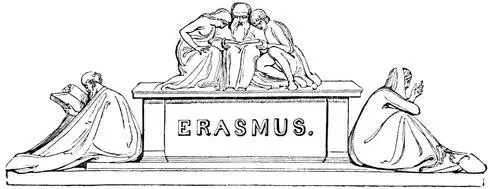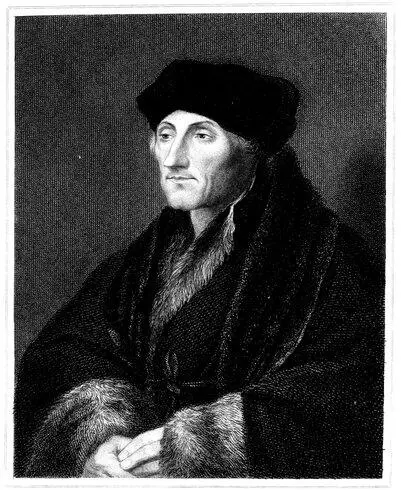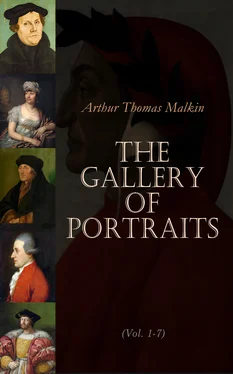He died August 19th, 1662, aged thirty-nine years and two months.
By those who knew him personally he is said to have been modest and reserved in his manners, but withal, ready to enliven conversation with that novelty of remark and variety of information which might be expected from his well stored and original mind. That spirit of raillery which should belong to the author of the Provincial Letters, showed itself also occasionally in his talk, but always with a cautious desire not to give needless pain or offence.
He seemed to have constantly before his eyes the privations and sufferings to which a large portion of the human race is exposed, and to receive almost with trembling, those indulgences which were denied to others. Thus, when curtailing his own comforts that he might perform more largely the duties of charity, he seemed only to be disencumbering himself of that which he could not safely retain.
As a philosopher, it is the great glory of Pascal, that he is numbered with that splendid phalanx, which in the seventeenth century, following the path opened by Galileo, assisted to overthrow the tyranny of the schools, and to break down the fences which for ages had obstructed the progress of real knowledge; men who were indeed benefactors to science, and who have also left behind them for general use an encouraging proof that the most inveterate prejudices, the most obstinate attachment to established errors, and hostility to improvement may be overcome by resolute perseverance, and a bold reliance on the final victory of truth. No one, however, will coldly measure the honour due to this extraordinary man by his actual contributions to the cause of science or literature. The genius of the child anticipated manhood: his more matured intellect could only show promises of surpassing glory when it escaped from the weak frame in which it was lodged.
For further information the reader is referred to the discourse on the life and works of Pascal, which first appeared in the complete edition of his works in 1779, and has since been published separately at Paris; to the Biographie Universelle; and to the life of Pascal, written by his sister, Madame Perier, which is prefixed to her edition of his Thoughts.

Table of Contents
Desiderius Erasmus was born at Rotterdam on the 28th of October, 1467. The irregular lives of his parents are related by him in a letter to the secretary of Pope Julius II. It is sufficient to state here, that this great genius and restorer of letters was not born in wedlock. His unsophisticated name, as well as that of his father, was Gerard. This word in the Dutch language means amiable . According to the affectation of the period, he translated it into the Latin term, Desiderius, and superadded the Greek synonyme of Erasmus. Late in a life of vicissitude and turmoil, he found leisure from greater evils to lament that he had been so neglectful of grammatical accuracy as to call himself Erasmus, and not Erasmius.
In a passage of the life written by himself, he says that “in his early years he made but little progress in those unpleasant studies to which he was not born;” and this gave his countrymen a notion that as a boy he was slow of understanding. Hereon Bayle observes that those unpleasant studies cannot mean learning in general, for which of all men he was born; but that the expression might apply to music, as he was a chorister in the cathedral church of Utrecht. He was afterwards sent to one of the best schools in the Netherlands, where his talents at once shone forth, and were duly appreciated. His master was so well satisfied with his progress, and so thoroughly convinced of his great abilities, as to have foretold what the event confirmed, that he would prove the envy and wonder of all Germany.

Engraved by E. Scriven. ERASMUS. From the original Picture by G. Penn, in his Majesty’s Collection at Windsor. Under the Superintendance of the Society for the Diffusion of Useful Knowledge. London, Published by Charles Knight, Pall Mall East.
At the age of fourteen Erasmus was removed from the school at Deventer in consequence of the plague, of which his mother died, and his father did not long survive her. With a view to possess themselves of his patrimony, his guardians sent him to three several convents in succession. At length, unable longer to sustain the conflict, he reluctantly entered among the regular canons at Stein, near Tergou, in 1486. Much condescension to his peculiar humour was shown in dispensing with established laws and customary ceremonies; but he was principally led to make his profession by the arts of his guardians and the dilapidation of his fortune. He describes monasteries, and his own in particular, as destitute of learning and sound religion. “They are places of impiety,” he says in his piece ‘De Contemptu Mundi,’ “where every thing is done to which a depraved inclination can lead, under the mask of religion; it is hardly possible for any one to keep himself pure and unspotted.” Julius Scaliger and his other enemies assert that he himself was deeply tainted by these impurities; but both himself and his friends deny the charge.
He escaped from the cloister in consequence of the accuracy with which he could speak and write Latin. This rare accomplishment introduced him to the Bishop of Cambray, with whom he lived till 1490. He then took pupils, among whom was the Lord Mountjoy, with several other noble Englishmen. He says of himself, that “he lived rather than studied” at Paris, where he had no books, and often wanted the common comforts of life. Bad lodgings and bad diet permanently impaired his constitution, which had been a very strong one. The plague drove him from the capital before he could profit as he wished by the instructions of the university in theology.
Some time after he left Paris, Erasmus came over to England, and resided in Oxford, where he contracted friendship with all of any note in literature. In a letter from London to a friend in Italy, he says, “What is it, you will say, which captivates you so much in England? It is that I have found a pleasant and salubrious air; I have met with humanity, politeness, and learning; learning not trite and superficial, but deep and accurate; true old Greek and Latin learning; and withal so much of it, that but for mere curiosity, I have no occasion to visit Italy. When Colet discourses, I seem to hear Plato himself. In Grocyn, I admire an universal compass of learning. Linacre’s acuteness, depth, and accuracy are not to be exceeded; nor did nature ever form any thing more elegant, exquisite, and accomplished than More.”
On leaving England, Erasmus had a fever at Orleans, which recurred every Lent for five years together. He tells us that Saint Genevieve interceded for his recovery; but not without the help of a good physician. At this time he was applying diligently to the study of Greek. He says, that if he could but get some money, he would first buy Greek books, and then clothes. His mode of acquiring the language was by making translations from Lucian, Plutarch, and other authors. Many of these translations appear in his works, and answered a double purpose; for while they familiarized him with the languages, the sentiments and the philosophy of the originals, they also furnished him with happy trains of thought and expression, when he dedicated his editions of the Fathers, or his own treatises, to his patrons.
Читать дальше














